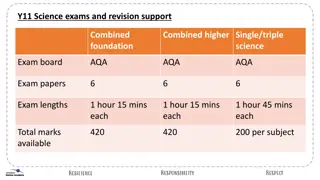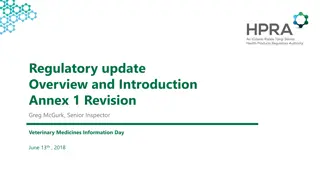Preparation for RO21 Exam: Revision Pack Overview and Key Terms Explained
This revision material is designed to help you prepare for the RO21 exam by covering topics such as care settings, service users' rights, values of care, legislation, security, and hygiene. The content includes key exam terms explained with examples and insights on service users' rights, emphasizing the importance of choice, confidentiality, protection from abuse, equal treatment, and consultation. Utilize the provided resources to review and understand these essential areas for exam success.
Download Presentation

Please find below an Image/Link to download the presentation.
The content on the website is provided AS IS for your information and personal use only. It may not be sold, licensed, or shared on other websites without obtaining consent from the author. Download presentation by click this link. If you encounter any issues during the download, it is possible that the publisher has removed the file from their server.
E N D
Presentation Transcript
Revision pack RO21 REVISION MATERIALS PREPARATION FOR RO21 Exam:
Care settings/care provider: a place that provides care to individuals such as: a hospital, care home, school, GP surgery. Service users: an individual who accesses or uses a service such as a patient, school child, elderly person. Over the past 4 months you have covered the following topics: Service users rights Values of care Legislation Security/safety and hygiene in care settings In preparation for the exam it is important that you review the areas covered. The revision pack will help you with this. Good luck!
Key Exam Terms Explained Promote / Promoting = Encourage / Help. Example: How do the values of care promote individual s rights? Maintain = Keep . Example: Suggest a way to maintain confidentiality in a hospital Support = Helps. Example: Discuss how promoting equality and diversity supports the rights of patients Impact = The result /effect it has. Example: Describe the impact when the values of care are not followed. Applying = Using. Example: Discuss the importance of applying the values of care Applied = Used. Example: Describe how care values could be applied by staff Effects = Results / Outcomes. Example: Analyse the effects on Sally if care values are not applied Demonstrate = Show. Example: Explain how staff could demonstrate that they value diversity Relevant = Means something to / links to. Example: The values of care are relevant to different groups of people Ensure = Making sure. Example: How would ensure that opportunities are equal Protects = Looks After. Example: Give an example of a security measure that protects individuals Service User / Care User / Individuals = The people USING the service. Example: Explain the rights of the service user
LO1: Service users rights Individuals have 5 rights The right to:- Choice Confidentiality Protection from abuse and harm Equal and fair treatment Consultation
Rights The right to CHOICE includes:- The right to CONSULTATION includes:- What type of care the individual would like if it were possible Joining in activities Food options Opinions and views being sought Selection of G.P. Where how/receive treatment The right to CONFIDENTIALITY includes Having personal notes stored securely Not being spoken about so others can hear
Equal and fair treatment Same rights Access provided Protection from abuse Not be abused in any way To feel safe
Maintaining rights Why is it important to maintain individual rights? To make people feel valued/ raise self esteem To empower To instil confidence and trust To feel safe To equality of access to services/treatments To have your individual needs met
Supporting with effective communication How care workers can support individuals to maintain their rights: Use effective communication Use vocabulary that can be understood Not be patronising Adapt the communication to meet the needs of the individual or the situation Listen to individual needs
Rights It is important to provide up to date information:- We can do this by sharing with service users: The time services open Type of care provided Location Alternatives available How care workers should challenge discriminatory behaviour:- S- Speak out I- Intervene R- Report
Rights Information should be provided about complaints procedures: The options service users have The steps to take when making a complaint procedures to follow Provide advocacy: What is an advocate? Someone to speak on behalf of someone who is unable to speak for themselves
LO2: Understand the importance of the values of care and how they are applied. What do I need to know? The values of care in health and social care Promoting equality and diversity Maintaining confidentiality Promoting individuals rights and beliefs. Identify where these values of care are applied. Health settings (GP surgery, hospital) Social Care settings (residential care homes) Early years care and education. (nursery, toddler group) Describe how these values are applied. By promoting equality and diversity By maintaining confidentiality By promoting individuals rights and beliefs By being a reflective practitioner.
Promoting equality and diversity Service users are entitled to be treated fairly and equally regardless of any differences. Discrimination can result in lowered self-esteem and lack of self-worth and belief within service users. All service users have the right to experience equal access to the care services on offer. Health problems can be made worse by unequal access to health care provision. It offers people from all situations, ethnicities and communities the opportunity to receive the care and information they need effectively and without misinterpretations.
Maintaining confidentiality All service users have the right to access any information held about them. Access to information allows the service user to be fully informed about the care they are receiving. The Data Protection Act 1998 and the Freedom of Information Act 2000 protects an individual s right to confidentiality in terms of unnecessary people having access to personal information. Any inaccurate information held about a service user can be updated or changed.
Promoting individuals rights and beliefs. Shows the person you value them. Promotes the service users self-esteem. Shows that their individual rights and beliefs are acknowledged no matter what those beliefs may be, or how they differ. A person should be treated with respect dignity and privacy in all aspects of their care
Where the values of care are applied. Setting Example Health setting Hospitals, GP surgeries, Dentists, Walk in Centres, Podiatrist, Physiotherapist. Social care setting Residential care home, Children s Care home, Day Care Centres. Early years care and education SureStart Centres, Nursery School, Toddler/Play groups.
Describe how these values of care are applied. Promoting equality and diversity Communicating with patients, service users and carers in a way that is accessible to them; Employing staff who are trained to speak different languages. Providing interpreters. Providing literature materials in a variety of language types. Making adjustments to the way they do their work and deliver services to take account of the particular needs of disabled people; Easy access in and around buildings. Disabled parking. More time allowed during appointments. Having patience. Understanding the role that cultural and religious beliefs play in health care and peoples' experiences of the health service; Meeting different food requirements. Treating everyone with dignity and respect at all times Taking into account peoples wishes in terms of medical treatment. Ensure that everyone gets care which takes account of their individual cultural and religious beliefs.
Promoting individuals rights and beliefs Allowing service users the right to refuse treatment. Allowing a patient to leave his bed at certain times to perform religious ceremonies. Allowing female patients the right to request a female nurse/GP etc. Allowing service users to refuse to be resuscitated. Allowing them the right to refuse a blood transfusion. The choice of GP surgery. Maintaining confidentiality Making sure written documents are kept locked way in filing cabinets. Follow the requirements of the Data Protection Act 1998. Paper and electronic personal information should be accurate and current and obtained for lawful reasons. Information should be protected against unauthorised access. Electronic files should be password protected. Care/service workers must never disclose information to an unauthorised person.
The 10 Early Years Care Values Explained Upholding the welfare of the child: This care value means that the safety and well-being of the child is the main priority for a nursery nurse. They should make sure that the children feel safe, happy and comfortable in the nursery. If a child does not feel this way, they would not want to go to nursery which means that their parent s would not want them to go to nursery either. Nursery staff can follow this care value by providing for children s PIES needs. Keeping children safe: This means that nurseries have put policies and procedures in place to make sure that the nursery is a safe environment for everyone. They have been put in place to protect children and to make sure that all the staff members are trained to look after the children e.g. CRB checks. To make sure that the nursery is safe, health and safety checks are carried out regularly. This ensures parents that their children are safe in the nursery . Working in partnership with parents and families: This involves regularly passing on important information to parents and making sure that all the information is shared about the child. This keeps both staff and parents up to date about their child. It helps to resolve any problems that a child or a staff member or parent may have. A nursery nurse can follow this care value by letting the parents know if their child is getting bullied. If a parent knows this, they can support their child and help them get through it
The 10 Early Years Care Values Explained Encouraging children s learning and development: This means making sure that the nursery staff are aware of each child s PIES needs and that they provide for them too. All activities should help children learn new skills and develop their knowledge. Nursery staff should also provide for any individual needs that a child may have. A nursery nurse can follow this care value by taking time out to help a child if they are struggling with anything. Valuing diversity: This care value makes sure that all of the children are treated equally and fairly. It means that all opportunities are available to all of the children no matter what their differences are. A nursery nurse will not be following this care value if he or she is treating a child differently due to their religion, culture, gender, personal circumstances or disability. Providing equal opportunities: This means that all of the children are entitled to the same opportunities to learn and develop as the other children, no matter how different they are. Some children should not be favoured by nursery staff or helped more, compared to the other children. This care value helps children achieve their full potential. An example of a nursery nurse breaking this care value is if he or she treats one child better than the other children. Due to the nursery nurse doing this, the other children would not be good at what they are learning whereas, that one child would be really good.
The 10 Early Years Care Values Explained Fostering anti-discrimination: This care value makes sure that children are not mistreated by staff or by other children because of the differences that they have. A child can be discriminated by their appearance, religion, personality etc. If a member of staff sees a child being discriminated in any way, it is their responsibility to stop it. Maintaining Confidentiality: This means keeping things private. It is important to keep things private so that the children stay safe from danger. Parental permission is needed to pass information on about the children to people outside the nursery. Nurseries should store the confidential information safely so it is protected from getting into the wrong hands for example, nursery staff should have locks on cabinets and passwords on computers. If a person came to the nursery asking for information about a certain child, the nursery staff should not give them any information and they should question the person about their identity and their relationship with the child. Working with other professionals: For this care value, a nursery nurse will have to share information with other professionals. This will help a nursery nurse provide for each child s individual needs for example, if a child has medical issues the nursery nurse will need to talk to health professionals such as doctors. A nursery nurse might need to talk to a social worker if a child has home life issues.
The 10 Early Years Care Values Explained Being a reflective practitioner: This means that a nursery nurse should look back at what he or she has done and assess it to make it better. This will help the nursery nurse become competent, more experienced and it will make their job easier. By looking back at what they have done, children will learn better and enjoy their time at nursery. It will also help the practitioner to evaluate the activities that they have designed and decide if they would make any changes the next time they carried out the activity.
The effects of applying the care values The effects on people who use services if the values of care are not applied: Physical pain if medication/treatment is not given. Intellectual loss of focus/concentration. Emotional feeling betrayed, low self esteem. Social feeling excluded from the group.
LO3: Understand how legislation impacts on Health and Social Care What do I need to know? At least three key facts about the following acts: Equality Act 2010 Children s Act 2004 Data Protection Act 1998 Health and Safety at Work Act 1974 Mental Health Act 2007 Explain how the legislation can effect the following people in particular: children and young people vulnerable adults ethnic minority groups people with disabilities men and women older adults
Equality Act 2010 It makes it law that every private, public and voluntary sector must not discriminate against employees and service users because of particular characteristics! So, if they discriminate against their employees or service users, they could be breaking the law! The Equality Act aims to make sure that people with certain protected characteristics are protected from discrimination. These characteristics are: o o o o o o o o Age Gender Maternity Marriage Race Religion Gender reassignment Sexual orientation Direct discrimination is when a group of people/ a person is treated worse than others. Indirect discrimination is when everyone is treated in a certain way that might affect a certain group in particular (i.e. a whole team being asked to work overtime which may effect a pregnant woman who is more tired than others).
Childrens Act 2004 The Children s Act 2004 provides the legal basis for how social services and other agencies deal with issues relating to children. The Children Act 2004 was designed with guiding advice for those who work with children. These guidelines include: o o o o o o To allow children to be healthy Allowing children to remain safe in their environments Helping children to enjoy life Assist children in their quest to succeed Help make a contribution a positive contribution to the lives of children Help achieve economic stability for our children s futures The Children s Act 2004 ensures that agencies work together to support the safety of children To provide quality education to children in care settings as well as children living with their families The Children Act ensures that any agency that is aware of the maltreatment of a child or the misconduct of a child s legal guardian should make their findings known to other agencies to protect the child as effectively as possible.
The Mental Health Act 2007 The Mental Health Act is the law under which someone can be admitted, detained and treated in hospital against their wishes To be detained or sectioned someone must be suffering from a mental disorder which requires assessment or treatment and this needs to be given in hospital in the interests of their own health or safety or to protect other people . The Act covers the rights of people while they are detained, how they can be discharged from hospital and what aftercare they can expect to receive New community treatment orders (support at home) will be introduced for patients following a period of detention in hospital. Being sectioned means being detained under a section (paragraph) of the Mental Health Act 1983 because doctors are worried you re going to hurt yourself or other people. You ll only be sectioned if you re too unwell to make decisions or understand that you need help. While you re sectioned, you can be held in a hospital, or receive treatment while continuing to live at home (known as a community treatment order). If you re under 18, you should be held in an age-appropriate environment, like an adolescent mental health ward.
The Health and Safety at Work Act 1974 The Health and Safety at Work Act 1974 provides the legal framework to promote, stimulate and encourage high standards of health and safety in places of work. o o o Employers must comply with the Act. They must: provide and maintain safety equipment and safe systems of work ensure materials used are properly stored, handled, used and transported provide information, training, instruction and supervision - ensure staff are aware of instructions provided by manufacturers and suppliers of equipment o o o o o provide a safe place of employment provide a safe working environment provide a written safety policy/risk assessment look after the health and safety of others, for example the public talk to safety representatives
Data Protection Act 2018 The Data Protection Act (DPA) is a law designed to protect personal data stored on computers or in an organised paper filing system. It was created to protect individuals from misuse of this data. The Data Protection Act has eight principles: Data must be kept secure; Data stored must be relevant; Data stored must be kept no longer than necessary; Data stored must be kept accurate and up-to-date; Data must be obtained and processed lawfully; Data must be processed within the data subject rights; Data must be obtained and specified for lawful purposes; Data must not be transferred to countries without adequate data protection laws Information Commissioner: Person who has the power to enforce the Act. Data Controller: Person or Company that collects and keeps data about people. Data Subject: Person who has data about them stored outside their direct control.
Describe how these acts give guidance to those who work in health and social care (Employers / Service Provider / Care Setting). Equality Act 2010 They must offer equal pay / There must not be any secrecy clauses (people must be allowed to talk about how much they get paid) / They must not discriminate against anyone with protected characteristics / They must have disciplinary procedures in place for anyone who does not follow the act / There must be a whistle blowing policy (to report anyone who is being discriminative / To check for updates to the Equality Act policy and keep up to date Children s Act 2004 A wide range of services and professionals provide support to families in bringing up children. They should work together in order to protect vulnerable children. key people and bodies work well individually and together through universal, targeted and specialist services to safeguard and promote the welfare of children; and that children, young people and their families receive effective support at the first sign of difficulties. Employers must have continuing training development that takes account of the need to safeguard and promote welfare of children. Ensuring that safe recruitment procedures in place; Establishing and co-operating in effective inter-agency working to safeguard and promote the welfare of children; Data Protection Act 2018 Any organisation or person who needs to store personal information must apply to register with the Information Commissioner / Data controllers must declare what information will be stored and how it will be used in advance. This is recorded in the register / Each entry in the register contains: The data controller's name and address, A description of the information to be stored., What they are going to use the information for, Whether the data controller plans to pass on the information to other people or organisations, Whether the data controller will transfer the information outside the UK, Details of how the data controller will keep the information safe and secure.
Health and Safety at Work Act 1974 It is an employer's duty to protect the health, safety and welfare of their employees and other people who might be affected by their business. Employers must do whatever is reasonably practicable to achieve this. This means making sure that workers and others are protected from anything that may cause harm, effectively controlling any risks to injury or health that could arise in the workplace. Employers have duties under health and safety law to assess risks in the workplace. Risk assessments should be carried out that address all risks that might cause harm in your workplace. Employers must give you information about the risks in your workplace and how you are protected, also instruct and train you on how to deal with the risks. Employers must consult employees on health and safety issues. Mental Health Act 2007 They cost your workplace a lot of money the Centre for Mental Health estimates that the total annual cost of mental health problems at work is over 30 billion. Employees can support staff by: extending additional paid or unpaid leave during a hospitalisation or other absence allowing additional time for workers to reach performance milestones allowing more frequent breaks allowing workers to allocate their break time according to their own needs, rather than by a pre-determined schedule allowing workers to shift schedules earlier or later assigning a co-worker to act as buddy or mentor
Describe how these acts support the rights of the individual (the service user) Equality Act 2010 You can not be discriminated against by an employer. This includes direct discrimination, indirect discrimination, harassment and victimisation. Employers must make reasonable adjustments to work practices, and provide other aids and adaptations, for disabled employees. The law covers you during recruitment, employment and if you are being dismissed for any reason, including redundancy. Children s Act 2004 The Children Act 2004 was designed with guiding principles in mind for the care and support of children. These are: To allow children to be healthy Allowing children to remain safe in their environments Helping children to enjoy life Assist children in their quest to succeed Help make a contribution a positive contribution to the lives of children Help achieve economic stability for our children s futures Data Protection Act 1998 Their information is kept fairly and lawfully. The information is only used for intended purposes. Data is accurate and up to date. Information is not transferred outside of Europe. Their information is not kept for any longer than necessary.
Health and Safety at Work Act 1974 Your rights as an employee to work in a safe and healthy environment are given to you by law and generally can't be changed or removed by your employer. The most important of these rights are: as far as possible, to have any risks to your health and safety properly controlled to be provided with any personal protective and safety equipment free of charge to stop work and leave your work area, without being disciplined if you have reasonable concerns about your safety to tell your employer about any health and safety concerns you have not to be disciplined if you contact the Health and Safety Executive for Northern Ireland (HSENI), or your local authority, if your employer won't listen to your concerns to have rest breaks during the working day to have time off from work during the working week to have annual paid holiday. Mental Health Act 2007 Mental Health is classed as a disability. An employer must not treat a disabled person less favourably than another employee because of disability. It is wrong for your employer to treat you badly because they think that you have a disability It is wrong to treat you unfavourably where this is linked to disability. Employers must make reasonable adjustments to work practices, and provide other aids and adaptations, for disabled employees. The law covers you during recruitment, employment and if you are being dismissed for any reason, including redundancy Employers are not allowed to use 'pre-employment questionnaires' to ask about your health before you are offered a job
LO4 Personal hygiene Hair tied back/covered Open wounds covered No jewellery No nail polish Appropriate hand washing Regular showering
Safety procedures Emergency procedures eg fire extinguisher, fire alarm, fire evacuation route Equipment considerations eg is it fit for purpose Appropriate training eg moving and handling techniques
Security measures Checking external entrances Monitoring of keys Security pads on doors Window locks Identifying staff eg lanyards Monitoring visitors eg visitor lanyards/ passes, signing in at reception
Methods for reducing spread of infection Eg wearing gloves/masks Risk assessment Staff training























